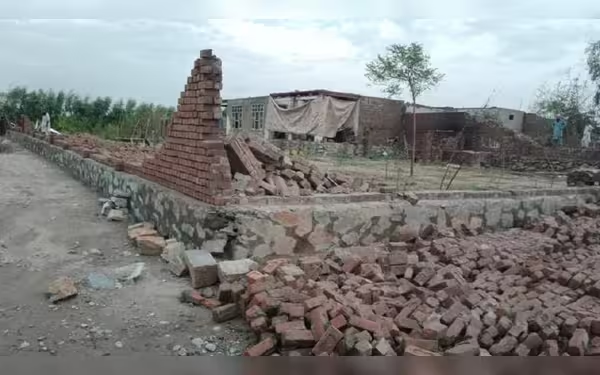Sunday, December 22, 2024 01:57 PM
Balochistan Flood Recovery: Unmet Promises and Ongoing Struggles
- Balochistan's recovery from floods remains painfully slow.
- Residents express frustration over unfulfilled government promises.
- Experts call for improved disaster management and local authority empowerment.
 Image Credits: thefridaytimes
Image Credits: thefridaytimesBalochistan struggles with slow recovery from 2022 floods, highlighting gaps in disaster response and unmet government promises.
In the wake of the catastrophic super floods that struck Pakistan in 2022, Balochistan has found itself in a prolonged struggle for recovery. Over two years have passed since the disaster, yet many communities in this southwestern province are still reeling from its effects. The slow pace of recovery efforts has left residents frustrated, as they face the harsh realities of inadequate support from both the provincial and federal governments. As the world convenes at COP29 in Baku, Azerbaijan, to discuss climate change, the plight of Balochistan's flood victims serves as a stark reminder of the urgent need for effective disaster response mechanisms.
In Dera Murad Jamali, a city in Balochistan, a mother of three continues to live in a tent that was meant to be a temporary shelter. "We lost everything in the floods. And while we were promised help, nothing substantial has been provided," she lamented. This sentiment is echoed by many others in the region, highlighting the unfulfilled promises made by government officials. A farmer from Naseerabad expressed his frustration, stating, "The government officials came, but only for photo sessions. Since then, we've had no meaningful assistance." Such stories paint a grim picture of the ongoing struggles faced by flood-affected families.
The floods of 2022 were devastating, claiming the lives of approximately 1,700 people across Pakistan. Balochistan recorded 336 fatalities, while Sindh suffered the highest toll with 799 deaths. The floods displaced around eight million people and caused extensive damage to homes, agriculture, and infrastructure, with economic losses estimated at $30 billion. Despite these staggering figures, the response to the disaster has been marred by delays and inefficiencies in aid distribution.
Experts have pointed out that the challenges in utilizing international climate funds stem from systemic issues within Pakistan's disaster management framework. Dr. Farooq Qamar, an economist specializing in disaster management, emphasized the lack of a centralized authority to oversee relief efforts. He stated, "Pakistan lacks a centralised authority that can efficiently manage and deploy large-scale relief projects." This fragmented approach has led to hesitance among international donors, who fear that their contributions may not be effectively utilized.
Asma Javed, an environmental governance specialist, further elaborated on the issue, noting that provincial governments often lack the financial and administrative capacity to manage disaster funds effectively. She advocates for empowering local authorities with greater autonomy, suggesting that this could lead to more responsive disaster management. "Regions like Balochistan need independent management structures with a clear accountability framework," Javed explained.
Despite the allocation of $220 million for flood rehabilitation in Balochistan, only a small fraction has been utilized, with approximately $22 million spent so far. The World Bank had initially approved a $400 million loan for rehabilitation, but the release of further funds is contingent upon the effective use of the first tranche. Additionally, China pledged a $200 million grant for housing reconstruction, yet much of this funding remains unutilized due to administrative hurdles.
At a recent event in Quetta, Bilawal Bhutto Zardari, Chairman of the Pakistan Peoples Party, expressed his concerns regarding the federal government's handling of rehabilitation funds. He criticized the lack of progress, stating that Balochistan has been treated like a "stepchild" in terms of flood relief. Despite promises made in the federal coalition agreement, no houses have been fully rebuilt, leaving many families in dire need of assistance.
The situation in Balochistan serves as a critical reminder of the importance of effective disaster response and management. As climate change continues to pose significant threats, it is imperative that both provincial and federal governments prioritize the needs of affected communities. By streamlining aid distribution and empowering local authorities, Pakistan can work towards a more resilient future, ensuring that no community is left behind in the face of disaster.













